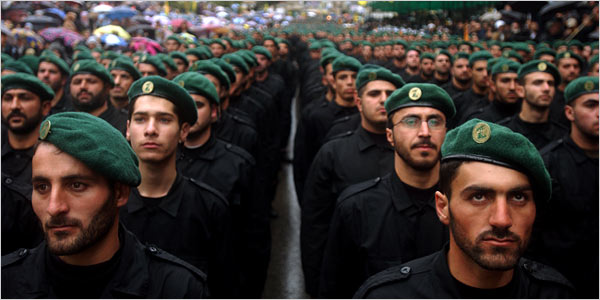
Hezbollah (aka “Party of God”) is an Iranian-funded Shia Muslim militia created in the 1980s, in the midst of Lebanon’s civil war. Much has been said about the “propaganda war” the group has been waging, a war that found its Peak with the building of a multi-million dollar museum in the town of Mleeta celebrating its military victories over Israel, as the magnificent video my friend Pierre sent me shows (don’t miss VICE´s Hezbollah´s propaganda war).
The militia has been using propaganda to transform itself into not only a military, but also a political force to be reckoned with (a real kingmaker in Lebanon), not only through an increased military build-up, but also through public relations (yeah, yeah, you read it right: I said PR). It seems that what some Western powers call “terrorist groups” (I won’t get into that) know how to balance Joseph Nye’s hard and soft power. The group’s leaders are well known for their inflammable speeches, and they do master the art of rhetoric, stressing its “glorious successes” against an Israel who has no right to exist (and thus justifying the use of violence), attacking the latter’s ally, the US, by representing it as the source of evil and terrorism… The propaganda can also take other forms: during the 2006 war, and like nowadays in Syria, the militia selectively chose the footage and information the foreign media was going to be provided with (notably images of harmed civilian and destroyed infrastructure).
Hezbollah has put in place a media empire: radio stations, newspapers, magazines… The group even has its own satellite television channel, Al-Manar (popular throughout the entire region), on which they show several of the group’s exploits such as the blowing of a number of US infrastructures in Beirut leading to the retreat of all American forces on the ground, the kidnapping and killing of Israeli soldiers…
The militia has also created a new kind of entertainment: the “Resistance tourism”, symbolized by this theme park where visitors can see real life rockets, examples of martyrdom, Israeli objects abandoned on the “battlefield” (even an Israeli grave!)… But also by guided tours throughout the controlled territories in Southern Lebanon, particularly those that were heavily bombed in 2006.
Hezbollah has also resorted to marketing: if you dare (I did not!) to step into any shop in Dahiya, the Hezbollah-controlled suburb of Beirut, you are bound to find an array of “souvenirs” portraying, amongst other things, the face of Hezbollah’s Secretary General Hassan Nasrallah (I here have a question: doesn’t Islam forbid the depiction of individuals, including Hezbollah leaders?).
In this battle to win over hearts and minds, Hezbollah has also built up a civilian framework which supports Lebanese Shiites in key fields such as education, health care, religion… providing various social services and being the main actors in the reconstruction of certain Beiruti neighbourhoods after both wars. Hezbollah has thus created, just like the Muslim Brotherhood has been doing in Egypt, a huge social base of support, above all amongst the poorest and those who have had nearly no access to education.
After all, all wars are also psychological wars, and the aim is to influence the insights and perceptions of various target audiences in the country and abroad. Obviously, the other “fronts”, the enemies of Hezbollah, have for their part also resorted (and still do) to various means, trying to compete with it. One outstanding example is that of Al-Jazeera, the Qatari satellite television channel (nowadays seconded by Saudi Arabia’s Al-Arabiya) praised for showing the realities of the Arab World to the outer world, but also accused o bias when it comes to particular issues (did you say Israel itself? Or did I hear Bahrain?). And don’t get me started on the public diplomacy put into place by Israel, the U.S. and most of the Western World. All of them, now or previously, have over-resorted to victimism. It all comes down to a matter of education and common sense, and to learning to discriminate information. But when you take into account the enormous figures of illiteracy existing in these countries, you realize a more important war to be waged lies ahead: the war for the actual wellbeing of the population.


